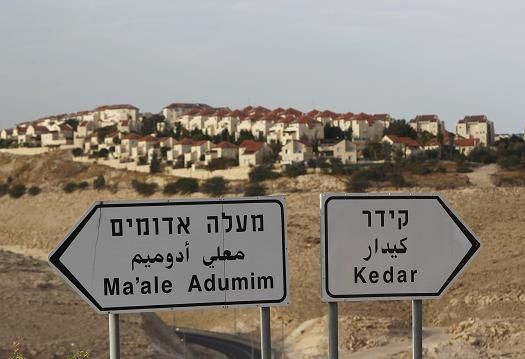Israel Retaliates Over UN Palestine Vote Amid Global Condemnation

Israel has raised the stakes in its seemingly endless battle against the Palestinians by taking a number of aggressive steps that have inflamed both Palestinians and the global community.
Over the weekend Israel announced that not only had it approved plans to add 3,000 new settlements in East Jerusalem and the West Bank, but that it will be withholding 460 million shekels (about $120 million) worth of tax funds that had been allocated for the salaries of Palestinian Authority officials, Haaretz reported.
Instead, the money will be used to pay down the estimated 700 million shekels (about $180 million) that the PA owes the Israel Electric Company, which keeps the lights and heat on in much of the West Bank.
Finance Minister Yuvel Steinitz admitted that this was another move to punish the PA for last week's U.N. vote that granted Palestine observer nonmember status.
Speaking to Israel Army Radio, he said, "If the Palestinians continue to advance their unilateral move, they should not expect bilateral cooperation. We will not collect their taxes for them, and we will not transfer their tax revenues."
Previous decisions on Israel's part to freeze funds, such as last year when the PA sought statehood in the U.N., have usually been met with harsh international criticism, Haaretz said.
Israeli officials had been discussing withholding funds since before last Thursday's vote, but had determined they would otherwise not actively try to ruin the Palestinian economy or otherwise undermine the Palestinian Authority, Haaretz said.
The Palestinian's reaction was, predictably, not very amicable. On Sunday officials in Ramallah called the announcement "an act of piracy and blackmail," the Jerusalem Post reported.
On Monday Israeli Prime Minister Benjamin Netanyahu's aides said Israel will not cancel settlement expansion plans in an area designated as E-1, which could effectively be the final death of a contiguous Palestinian state with East Jerusalem, YNet News said.
Netanyahu told his Cabinet on Monday morning that Israel was "forced" to speed up the planning of these new settlements.
"The attack on Zionism and the State of Israel forces us to reinforce and speed up the implementation of the settlement plans in all the areas the government has decided to settle in," Netanyahu said, quoting former Prime Minister Yitzhak Rabin. He said Israel will "continue to build in Jerusalem and in all the places of the State of Israel's map of strategic interests. The PA's unilateral move at the U.N. is a blatant violation of agreements, and therefore the Israeli government rejects the General Assembly resolution.
"I would like to clarify once again – there will be no Palestinian state without an agreement guaranteeing the security of Israel's citizens, there will be no Palestinian state before the State of Israel is recognized as the Jewish people's state, and there will be no Palestinian state before the Palestinians declare the end of the conflict."
But Michael Koplow, a Ph.D. student at Georgetown University, wrote in the Daily Beast that Israel might just be bluffing.
"Netanyahu knows that actually sending construction crews and cement mixers into E1 will worsen Israel’s image problem," he wrote. "As dedicated as Netanyahu has been to the settlement project, even he must now realize that building Mevaseret Adumim [area E-1] is a bridge too far."
So why declare such intentions in the first place? Politics, of course, Koplow says.
The U.N. vote was an embarrassment for Israel, and Netanyahu has been taking criticism from the right -- his own side -- for not going far enough during the so-called Operation Pillar of Defense attack on Gaza. Now, seven weeks before the Israeli elections, a grand pronouncement like thousands of new settlements could help bolster Netanyahu's and his party, Likud's, image as being "tough on Palestinians."
The international reaction to Israel's pronouncement has wavered between that of a disappointed parent and that of outraged sibling. Israel's ambassadors to France, England, and Sweden have been summoned back to discuss the settlement plan, Al-Jazeera said.
There are reports that France and Britain are considering recalling their ambassadors to Israel, but those have not been confirmed. French officials told Al-Jazeera they were deciding how to best "show their disapproval," and British officials are "frustrated … by the scale of the expansion … and the timing of the announcement."
Russia and Germany have also expressed diplomatic distress over Israel's plan. EU Foreign Policy Chief Catherine Ashton said that she was "extremely worried" about the scale of the expansion, and about "the extent to which such expansion may represent a strategic step undermining the prospects of a contiguous and viable Palestine with Jerusalem."
In a statement released Monday, U.N. Secretary General Ban Ki-Moon expressed his "grave concern and disappointment" over the new settlements, noting that "settlements are illegal under international law" -- a fact Israel has ignored for the last 45 years.
"In the interests of peace, any plans for E-1 must be rescinded," Ban's spokesperson said.
Even U.S. Secretary of State Hillary Clinton said she thought this was not a step in the right direction, Voice of America reported.
"At a time when religious extremists claim to offer rewards in the hereafter, Israel needs to help those committed to peace deliver for their people in the here and now," Clinton said.
© Copyright IBTimes 2024. All rights reserved.






















